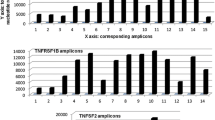Abstract
Background: Although biologic therapies have revolutionized the treatment of psoriasis, patients exhibit a substantial heterogeneous response that could be due to complex genetic heterogeneity.
Objective: The aim of this study was to investigate the possible influence of tumor necrosis factor-α (TNF), TNF receptor I (TNFRSF1A), and TNF receptor II (TNFRSF1B) gene polymorphisms on anti-TNF treatment responsiveness in psoriasis patients.
Methods: A Greek multicenter collaboration was established to recruit a cohort of patients (n = 80) with psoriasis treated with anti-TNF drugs. Single nucleotide polymorphisms (SNPs) in TNF -238G>A, -308G>A, -857C>T), TNFRSF1A (36A>G), and TNFRSF1B (676T>G) were genotyped by PCR-restriction fragment length polymorphism assays. SNPs and haplotypes, including stratification by comorbidity status, were analyzed for association with treatment response after 6 months of therapy, defined as a reduction in the Psoriasis Area and Severity Index (PASI) score by >75% (responders) or ≤50% (nonresponders).
Results: Sixty-three patients (78.8%) were defined as responders (PASI score reduction >75%) and 17 patients (21.2%) were defined as nonresponders (PASI score reduction ≤50%). Carriage of TNF -857C or TNFRSF1B 676T alleles was associated with positive response to drug treatment in patients treated with etanercept (p = 0.002 and p = 0.001, respectively). None of the genotyped SNPs were associated with responsiveness to treatment with infliximab or adalimumab. Additionally, when patients were stratified by comorbidity status, none of the genotyped SNPs were alone associated with responsiveness to drug treatment.
Conclusion: This study is the first in the field of psoriasis demonstrating a strong association between genetic markers and positive response to drug treatment. Validation of this result in larger studies, as well as analysis of other drug treatments, could provide the basis for individually tailored treatment, along with increased cost effectiveness and reduced unnecessary exposure to toxicity.






Similar content being viewed by others
References
Griffiths CE, Barker JN. Pathogenesis and clinical features of psoriasis. Lancet 2007; 370: 263–71
Bowcock AM, Krueger JG. Getting under the skin: the immunogenetics of psoriasis. Nat Rev Immunol 2005; 5: 699–711
O’Rielly DD, Rahman P. Pharmacogenetics of psoriasis. Pharmacogenomics 2011; 12(1): 87–101
Ryan C, Menter A, Warren RB. The latest advances in pharmacogenetics and pharmacogenomics in the treatment of psoriasis. Mol Diagn Ther 2010; 14(2): 81–93
Lowes MA, Bowcock AM, Krueger JG. Pathogenesis and therapy of psoriasis. Nature 2007; 445: 866–73
Chen YF, Jobanputra P, Barton P, et al. A systematic review of the effectiveness of adalimumab, etanercept and infliximab for the treatment of rheumatoid arthritis in adults and an economic evaluation of their cost-effectiveness. Health Technol Assess 2006; 10: 1–248
Plenge RM, Criswell LA. Genetic variants that predict response to anti-tumor necrosis factor therapy in rheumatoid arthritis: current challenges and future directions. Curr Opin Rheumatol 2008; 20: 145–52
Vasilopoulos Y, Bagiatis V, Stamatopoulou D, et al. Association of anti-CCP positivity and carriage of TNFRII susceptibility variant with anti-TNFα response in rheumatoid arthritis. Clin Exp Rheumatol 2011; 29(4): 701–4
Warren RB, Smith RL, Campalani E, et al. Outcomes of methotrexate therapy for psoriasis and relationship to genetic polymorphisms. Br J Dermatol 2009; 160(2): 438–41
Lin DY, Hu Y, Huang BE. Simple and efficient analysis of disease association with missing genotype data. Am J Hum Genet 2008; 82: 444–52
Kooloos WM, de Jong DJ, Huizinga TW, et al. Potential role of pharmacogenetics in anti-TNF treatment of rheumatoid arthritis and Crohn’s disease. Drug Discov Today 2007; 12: 125–31
Haider AS, Cardinale IR, Whynot JA, et al. Effects of etanercept are distinct from infliximab in modulating proinflammatory genes in activated human leukocytes. J Investig Dermatol Symp Proc 2007; 12(1): 9–15
van Heel DA, Udalova IA, De Silva AP, et al. Inflammatory bowel disease is associated with a TNF polymorphism that affects an interaction between the OCT1 and NF(-kappa)B transcription factors. Hum Mol Genet 2002; 11(11): 1281–9
Glossop JR, Dawes PT, Nixon NB, et al. Polymorphism in the tumour necrosis factor receptor II gene is associated with circulating levels of soluble tumour necrosis factor receptors in rheumatoid arthritis. Arthritis Res Ther 2005; 7: R1227–34
Rego-Pérez I, Fernández-Moreno M, Blanco FJ. Gene polymorphisms and pharmacogenetics in rheumatoid arthritis. Curr Genomics 2008; 9: 381–93
Kang CP, Lee KW, Yoo DH, et al. The influence of a polymorphism at position -857 of the tumour necrosis factor alpha gene on clinical response to etanercept therapy in rheumatoid arthritis. Rheumatology (Oxford) 2005; 44: 547–52
Gisondi P, Tessari G, Conti A, et al. Prevalence of metabolic syndrome in patients with psoriasis: a hospital-based case-control study. Br J Dermatol 2007; 157(1): 68–73
Woolf RT, Smith CH. How genetic variation affects patient response and outcome to therapy for psoriasis. Expert Rev Clin Immunol 2010; 6(6): 957–66
Acknowledgments
Zissis Mamuris and Angeliki Roussaki-Schulze contributed equally to this work.
We are very grateful to all participants in the study. The postgraduate programs ‘Biotechnology-Quality Assessment in Nutrition and the Environment’ and ‘Molecular Biology and Genetics Applications - Diagnostic Markers’ of the Department of Biochemistry and Biotechnology at the University of Thessaly, Greece, supported this work.
The authors have no conflicts of interest directly related to the content of this study.
Author information
Authors and Affiliations
Corresponding author
Rights and permissions
About this article
Cite this article
Vasilopoulos, Y., Manolika, M., Zafiriou, E. et al. Pharmacogenetic Analysis of TNF, TNFRSF1A, and TNFRSF1B Gene Polymorphisms and Prediction of Response to Anti-TNF Therapy in Psoriasis Patients in the Greek Population. Mol Diagn Ther 16, 29–34 (2012). https://doi.org/10.1007/BF03256427
Published:
Issue Date:
DOI: https://doi.org/10.1007/BF03256427




